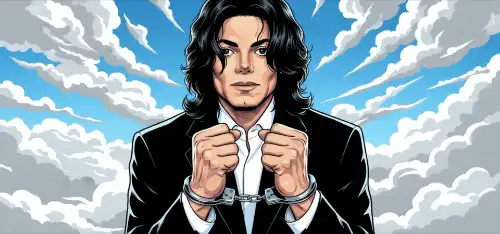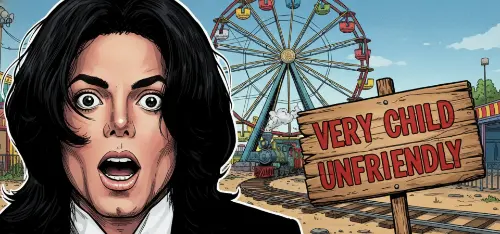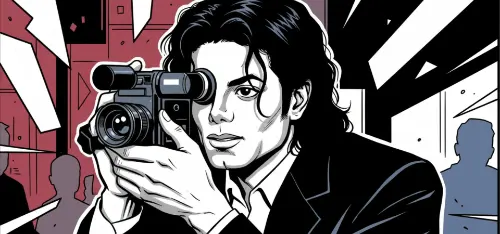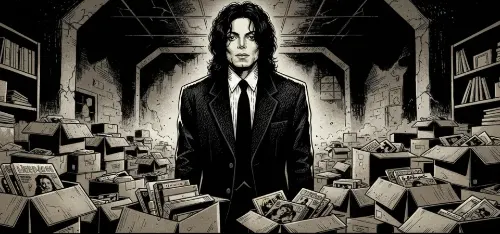Gavin Arvizo’s Denial: The Truth Behind a Misunderstood Statement

July 27, 2025
During the 2005 trial of Michael Jackson, lead defence lawyer Thomas Mesereau cross-examined Gavin Arvizo about a significant claim he had made to his school principal, Mr Jeffrey Alpert. Specifically, Gavin had previously told Mr Alpert that Michael Jackson had never sexually abused him.
Mesereau’s decision to highlight this denial in court was strategic. By drawing attention to Gavin’s earlier statement, he aimed to undermine the boy’s credibility in front of the jury. The logic was simple yet striking: if Gavin had once emphatically denied any abuse, why should his current allegations be taken seriously?
Unsurprisingly, Jackson's supporters seized upon this contradiction. To this day, many fans cite Gavin’s prior denial as definitive proof that he fabricated his claims.
However, while it is indisputably true that Gavin denied being sexually abused by Michael Jackson when speaking to his school principal, the circumstances surrounding that denial are far more complex—and deeply emotional than just a few words.
Before unpacking the reasons behind Gavin's earlier denial, let us first revisit the specific question Thomas Mesereau posed to him during the trial. Below is a key excerpt from Gavin’s testimony;
Q. Okay. And did you tell Mr. Sneddon you were pretty sure you had had a conversation with Dean Alpert at John Burroughs School.
A. Yes.
Q. Did you tell Mr. Sneddon approximately when you had that discussion.
A. No.
Q. Did Mr. Sneddon ever ask you when you had that discussion.
A. No.
Q. Where did the discussion with Dean Alpert take place.
A. I don’t remember. It was probably in his office.
Q. Okay. And the purpose of the discussion was what, if you know.
A. It was probably about Michael.
Q. Okay. You say “probably about Michael”.
A. Uh-huh.
Q. But you’re not sure.
A. I’m not sure what the whole conversation was about.
Q. Okay. But sometime in that conversation, Dean Alpert looked you in the eye and said, “Are these allegations that Mr. Jackson sexually abused you true,” right.
A. Uh-huh.
Q. And you said they were not true, right.
A. Yeah. I told him that Michael didn’t do anything to me.
Q. Okay. Mr. Alpert asked you twice whether or not Michael Jackson had ever done anything of a sexual nature to you, correct.
A. I don’t know if he asked me twice.
When Gavin was questioned by prosecutor Thomas Sneddon during the trial, he offered an emotionally charged explanation for why he had previously denied being sexually abused. His denial, he clarified, was not a reflection of the truth, but rather a desperate response to the unrelenting bullying he faced at school, which began to intensify after the broadcast of the now-infamous Martin Bashir documentary Living With Michael Jackson.
In the aftermath of the programme's release, Gavin became the target of cruel taunts and ridicule from his peers. They jeered at him, referring to him with disturbing phrases such as, “That’s the kid that got raped by Michael Jackson.” These comments inflicted significant emotional damage, leaving Gavin humiliated, isolated, and overwhelmed.
Faced with this hostile environment, Gavin made the painful decision to deny that the abuse had occurred at a later date. His hope was to avoid further harassment, and reclaim some sense of normality in his day-to-day life. Rather than being a moment of clarity, his denial was an act of self-preservation—driven by the need to protect himself from ongoing psychological harm.
Gavin provided a detailed clarification regarding his denial on page 31:
Q. So there were fights that you got into after you left Neverland Valley Ranch because of the things that the kids were saying to you?
A. Yes.
Q. And when you get in a fight, what happens? Where do you have to go?
A. They took us to Dean Alpert.
Q. Now, you were asked yesterday whether you had a conversation with Dean Alpert where he asked you whether or not Mr. Jackson had touched you. Do you recall that?
A. Yes.
Q. And you recall that you probably told him it didn't happen, correct?
A. I told him that it didn't happen.
Q. Okay. You told him it didn't happen?
A. Yes.
Q. Okay. Why did you tell him that?
A. Because all the kids were already making fun of me in school, and I didn't want anybody to think that it really happened.
Such denials are not uncommon in cases of sexual abuse, particularly those involving preadolescent boys abused by older men. Victims may deny their experiences for various reasons, including embarrassment, social pressure, fear of judgement, or concerns about being disbelieved. Psychological and legal studies have extensively documented this phenomenon, demonstrating that a victim's denial—especially under duress—does not necessarily indicate that the abuse did not occur.
For example, Child Molesters: A Behavioral Analysis, states the following:
The most common reasons victims do not disclose are a fear of the stigma of homosexuality; lack of societal understanding; presence of positive feelings for the offender; embarrassment, shame, or fear over their victimization; or do not believe they are victims. Since most of the offenders are male, fear of the stigma of homosexuality is usually a significant issue for victims who are boys. Although being seduced by a male child molester does not necessarily make a boy a homosexual, the victims do not understand this. If a victim does disclose, he risks significant ridicule by his peers and lack of acceptance by his family.
On 30 March 2005, psychologist Dr Stan Katz—widely recognised for his expertise in assessing the reliability of sexual abuse claims—gave evidence in court. He explained that attorney Larry Feldman had approached him to conduct interviews with Gavin Arvizo and his brother. The purpose of these interviews was to help determine the credibility of their allegations against Michael Jackson.
Dr Stan Katz explained that it was “extremely unusual” for a pre-adolescent or adolescent boy to invent claims of sexual abuse. He underscored the psychological and emotional complexities surrounding boys’ disclosures in such cases, especially due to the stigma and internal conflict often tied to their developing sense of identity.
According to Katz, boys in this age group are typically hyper-aware of their sexuality and frequently experience heightened feelings of guilt, shame, and confusion when it comes to anything deemed "extraordinary" or outside the bounds of what they perceive as normal behaviour. This internal discomfort, he suggested, discourages them from speaking openly even when they are victims.
His testimony (page 262):
Q. What is your understanding about the percentage of false allegations in those types of cases involving older children?
A. My experience, my clinical experience, my collegial experience, is that there’s very, very few false allegations made with alleged perpetrators outside the family by a child over the age of five.
Q. And involving specifically allegations of sexual abuse involving boys, adolescent boys, what are the difficulties involved in making a false allegation --
A. Well --
Q. -- or sustaining it?
A. A pre-adolescent or adolescent boy is hypersensitive about his sexuality. It would be extremely unusual for a child who’s developmentally at a stage where he’s trying to figure out who he is, and to actually become a man, to make an allegation which would suggest that he’s had inappropriate sexual relationships with a male. It would be extremely rare because these children are so protective and so guilt-ridden and shamed by any behavior that’s extraordinary and extra-normal. So it would be highly unusual in my experience for a 12- or 13-year-old to make false allegations regarding a male perpetrator.
In conclusion, it is accurate that Gavin Arvizo denied being sexually abused by Michael Jackson when questioned by his school principal. However, this denial must be understood within the context of intense social pressure. At the time, Gavin was facing persistent harassment and bullying from fellow pupils, and he feared being stigmatised as the boy who was raped by Michael Jackson. In an attempt to deflect attention and preserve some sense of normality amidst a hostile environment, he chose to deny the abuse—despite its truth.
With permission, the following article was translated and enhanced from The Truth about Michael Jackson, with further details added by myself.





